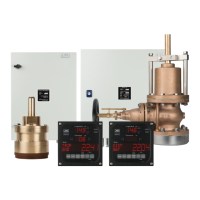7-4
2 Design, general
2.1 Display windows
There are two small and one large display windows on the internal Printed Circuit
Board. Depending on type of Display some windows can be partly or completely
covered by the front panel foil. The two small windows are positioned above each
other in the upper area of the front, from here on called SPEED WINDOW 1 and
SPEED WINDOW 2.
The large window is positioned in the lower area of the front, from here on called
MODE WINDOW. An exemption is made for type NWW-85 Docking Display where
only the centre area of the MODE WINDOW is used as SPEED WINDOW 3.
The display elements in each SPEED WINDOW consist of 90 surface mounted Light
Emitting Diodes/LEDs positioned to perform three digits in a 7-segment manner.
The MODE WINDOW consists of 1056 LEDs positioned in 11 rows by 96 columns
making it possible to display both text and digits in various sizes (alpha-numeric).
2.2 Direction arrows, status indications and backlight
71 LEDs are used for direction arrows, status indication and backlight illumination of
text printed on the panel foil.
2.3 Push buttons
To operate the Display, there are 6 push buttons positioned below the MODE
WINDOW.
3 Function, general
All Display versions will decode all defined messages and display all possible
information as available. Generally, all Displays can enter all requested modes.
3.1 MODE WINDOW
The MODE WINDOW can display a range of information, e.g. distance counter(s),
speed(s), depth and Rate-of-Turn depending on which presentation modes are enabled
in the Display set-up (See 6. Set-up of Display for detailed information). All Displays
are delivered with certain modes pre-set as default that corresponds to the specific
Display version but all modes can be enabled in the Display set-up as desired by the
user.
Every time the Mode button is pressed, the MODE WINDOW will display the next
option from the list of chosen options. When Mode and buttons are pressed
simultaneously the previous option (= going backwards) in the list will be displayed.
When the Trip/DIST button is pressed and Trip or DIST is not displayed, the first Trip
or DIST will be displayed.
When the Trip/DIST button is pressed and Trip or DIST is displayed the next Trip or
DIST in the list will be displayed.
When the Trip/DIST button is pressed and the last Trip or DIST is displayed the first
Trip or DIST will be displayed.

